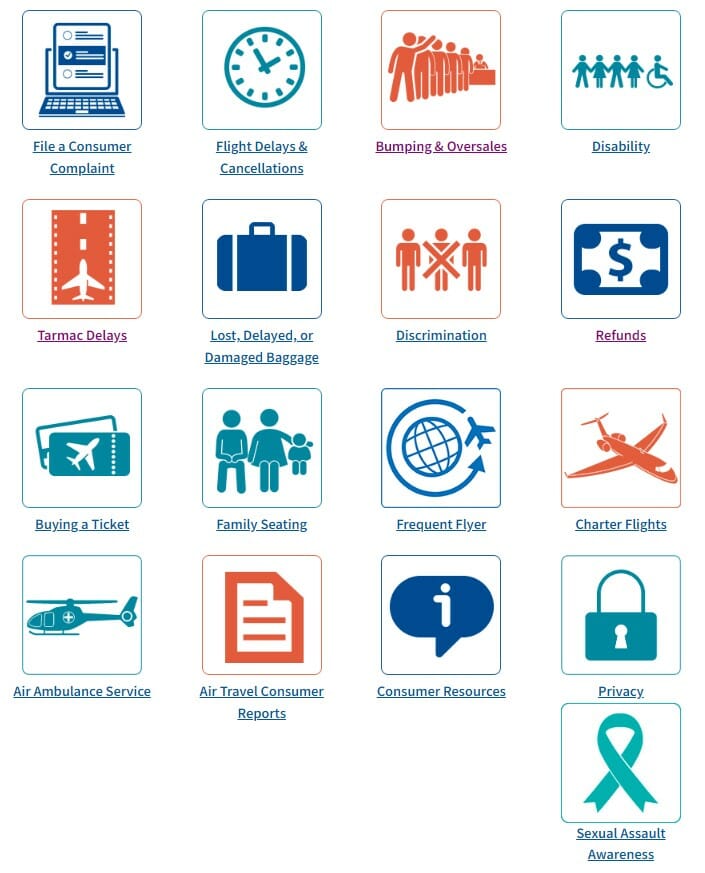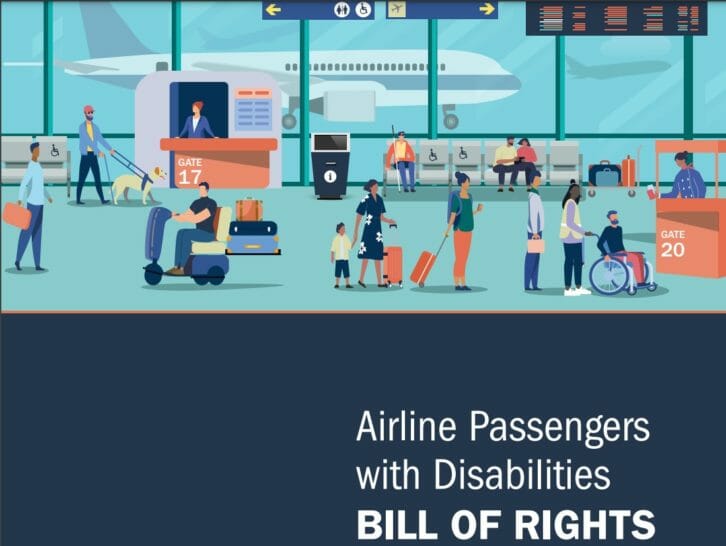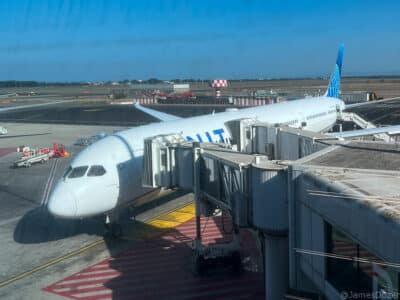Last week, there was a lot of press about the new USDOT dashboard so you can know what you should expect from your airline regarding late flights and cancellations. What didn’t get much press is that there is a passenger with disabilities bill of rights. I will start out with the passengers with disabilities bill of rights and recap on the new USDOT air passenger “dashboard”.
Airline Passengers with Disabilities Bill of Rights
This Bill of Rights describes the fundamental rights of air travelers with disabilities under the Air Carrier Access Act and its implementing regulation, 14 Code of Federal Regulations (CFR) Part 382 and is current as of July 2022. You can find the disabilities bill of rights website here.
This Bill of Rights covers the following areas:
- The Right to Be Treated with Dignity and Respect.
- The Right to Receive Information About Services and Aircraft Capabilities and Limitations.
- The Right to Receive Information in an Accessible Format.
- The Right to Accessible Airport Facilities.
- The Right to Assistance at Airports.
- The Right to Assistance on the Aircraft.
- The Right to Travel with an Assistive Device or Service Animal.
- The Right to Receive Seating Accommodations.
- The Right to Accessible Aircraft Features.
- The Right to Resolution of a Disability-Related Issue.
It is about time that passengers with disabilities are treated with the care and compassion that they deserve. The have been horror stories of disabled passengers stranded at the airport without an escort. In 2017, a 74-year-old woman died when she drove her motorized cart onto the down escalator at Portland International Airport. Her escort from the airport contract company, Huntleigh left her alone.
Some airlines are approved by DOT to use an alternative method to comply with regulation when it provides an equivalent level of accessibility or it meets the objective of Part 382. Visit the docket for the Equivalent Alternative Determinations and Conflict of Law Waivers for more information.
DOT Air Travel Consumer Report
Passenger complaints are up 270% above pre-pandemic levels. The latest edition of the Air Travel Consumer Report (ATCR) has been released. The data contained in this report is through June 30, 2022. You can read a copy of it here. This report breaks down problems into multiple categories:
- On-time performance,
- Consumer complaints,
- Mishandled baggage,
- Mishandled wheelchairs and scooters and
- Bumping/overselling.
The ATCR is designed to assist consumers with information on the quality of services provided by airlines. The Department of Transportation remains committed to ensuring airline passengers are treated fairly and is concerned about recent flight cancellations and flight disruptions. The Department’s Office of Aviation Consumer Protection (OACP) is monitoring airlines’ operations to ensure that airlines are not engaging in unrealistic scheduling of flights and are complying with aviation consumer protection requirements. This includes ensuring consumers receive prompt refunds if they are no longer interested in continuing their travel when their flights are canceled or significantly changed.
Secretary Buttigieg revealed that nearly a quarter of domestic flights were delayed and just over 3% were canceled in the first half of this year. “We are also contemplating options for rulemaking that would further expand the rights of airline passengers who experience disruptions,” Buttigieg wrote. He added that DOT asks that airlines, at a minimum, provide meal vouchers for delays of 3 hours or more and lodging accommodations for passengers who must wait overnight at an airport due to flight cancelations.
Passenger complaints from May to June of this year climbed 35%. To be fair to the airlines, there are delays and cancellations due to circumstances outside of the airline’s control like weather, airport congestion and Air Traffic Control delays.
DOT Aviation Consumer Protection
The U.S. Department of Transportation’s Office of Aviation Consumer Protection website can be found here. The Office of Aviation Consumer Protection reviews and responds to consumer complaints and promotes awareness and understanding of consumer rights through online consumer information and education. The site describes DOT rules, guidance, and enforcement orders related to aviation consumer and civil rights matters. The Department of Transportation has information dealing with the following situations:

The “Dashboard”
The purpose of the DOT airline passenger dashboard is to inform travelers how much they are owed for flight cancellations and controllable delays. The dashboard will be featured with comparative information on the services that each of the large U.S. airlines provides, said Transportation Secretary Pete Buttigieg.
The Department of Transportation wants to give passengers clear information about their rights and how to proceed to get their refund. This dashboard is scheduled to go online on September 2, 2022, at www.transportation.gov/airconsumer. The dashboard will have a matrix appearance with expectations listed by airline. I would expect that the dashboard will have exemptions for causes like weather and air traffic control delays.
Is It Working?
Last Saturday, we were flying nonstop from San Diego to Boston. San Diego International Airport has two runways, 9 and 27. Runway 27 is the prevailing wind runway where aircraft take off to the west over the ocean. Due to an off-shore wind, the airport was using runway 9 which has a ridge to clear after takeoff. Our aircraft was too heavy for a runway 9 departure which resulted in a four-hour delay. After two hours, Alaska Airlines sent $24 meal vouchers to the passengers by email. The solution for departing San Diego was to offload 5,000 pounds of fuel and stop en route at Kansas City and pick up the 5,000 pounds of fuel so we could continue to Boston.


Final Thoughts
The airline passengers’ Bill of Rights is sorely needed and way overdue by the DOT. All passengers deserve dignity and respect regardless of their physical and mental abilities.
The airline customer service dashboard is a step in the right direction. The industry needs to come up with a general passenger bill of rights for flight delays and cancellations. Will the U. S. Department of Transportation do more?






